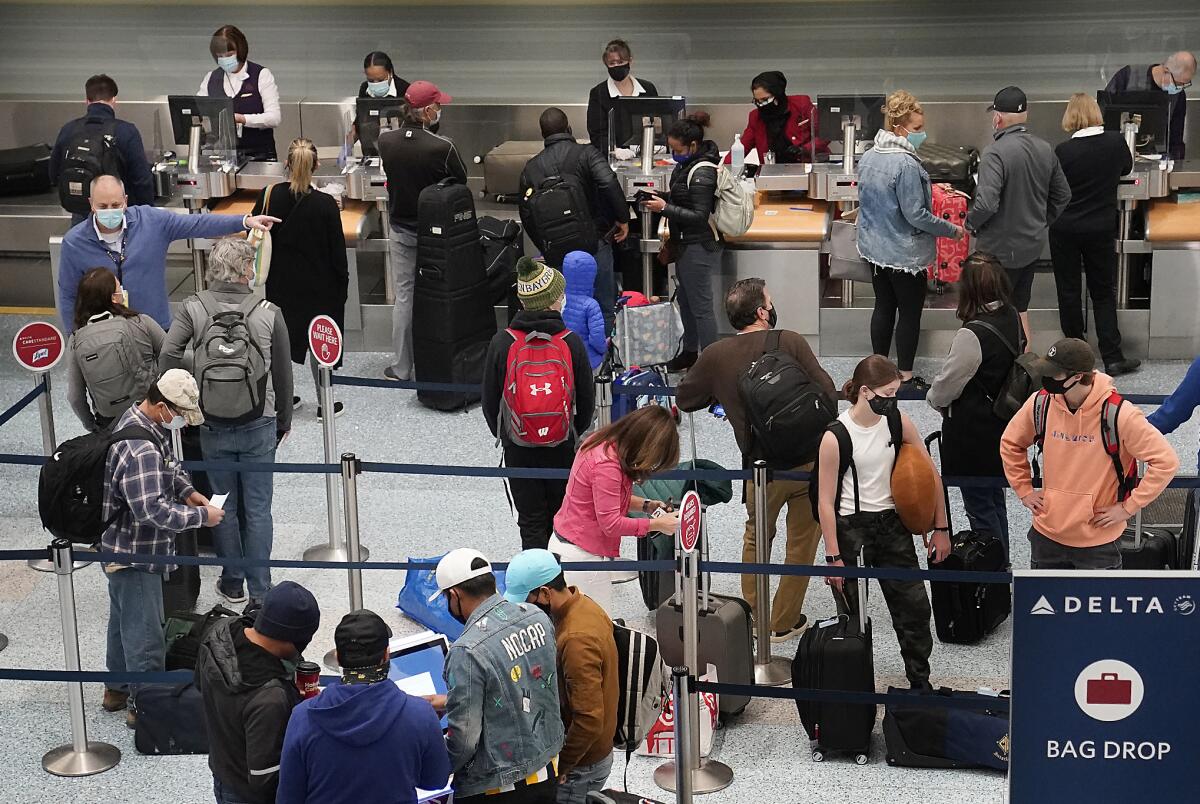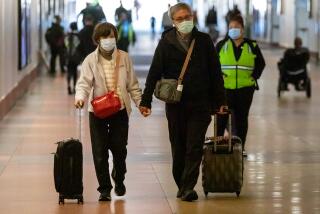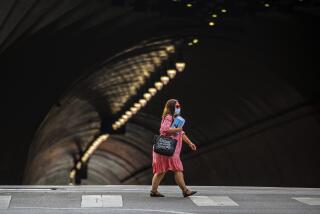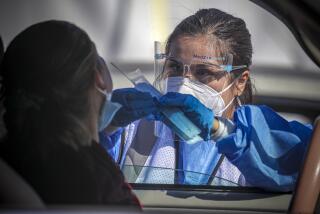Coronavirus hospitalizations worsen in California, raising new alarms

- Share via
The number of people hospitalized with coronavirus infections in California has doubled in just the last two weeks and is rapidly headed to breaking past its summertime high, according to a Times analysis.
The surge in hospitalizations came as California surpassed another bleak milestone: More than 19,000 deaths related to COVID-19, according to The Times’ independent county-by-county tally.
There were nearly 6,650 people with coronavirus infections in California’s hospitals as of Thursday, double the number that existed on Nov. 11, when 3,300 people were hospitalized. Thursday’s hospitalization numbers were 93% of the peak of COVID-19 hospitalizations, which was recorded in mid-July, when 7,170 people were in the hospital.
The extraordinary growth in hospitalizations is accelerating at a sustained pace that is unprecedented since the first months of the pandemic. In Los Angeles County, the total number of people who are in hospitals with coronavirus infections is jumping by roughly 80 patients a day on average over a seven-day period — a rate of increase not seen since the earliest weeks of the pandemic.
By Thursday, more than 1,950 people with coronavirus infections were hospitalized in L.A. County. That’s more than 87% of L.A. County’s worst day for hospitalizations, in mid-July, when more than 2,200 COVID-19 patients were in hospitals.
Health officials in Los Angeles County have sounded the alarm that they are on pace to see a shortage of beds — especially in intensive care units — over the next two to four weeks if these trends continue.
Should the number of COVID-19 patients continue to rise, “people should be prepared to potentially have their nonessential surgeries or procedures canceled so that hospitals can make room,” Dr. Christina Ghaly, the county director of health services, said Wednesday.
Though hospitals have plans in place to expand their capacity if necessary, Ghaly said the bigger challenge is staffing — particularly in intensive care units. There are only so many nurses, doctors and other staff properly trained to provide ICU-level care.
San Diego County was on its sixth consecutive day of record numbers of hospitalized COVID-19 patients, with 563 people in its hospitals as of Thursday. That’s already a 37% increase above its previous high of 411, set in the summer.
San Bernardino County on Thanksgiving broke its all-time record for COVID-19 hospitalizations, with 656 people in hospital beds on Thursday — exceeding its previous record of 638 patients set in July.
Riverside County reported 498 hospitalized patients Thursday, closing in on its all-time record of 550, also set in July.
COVID-19 hospitalizations have doubled in Orange County in the last dozen days or so. More than 500 people with coronavirus infections were in Orange County’s hospitals as of Thursday; there were nearly 250 such patients on Nov. 14. Ventura County was in the same situation: There were 81 people listed in hospitals in the coastal county Thursday, up from 38 on Nov. 14.
Other areas of California were also hit hard. Sacramento County on Thursday recorded 263 COVID-19 patients in its hospitals, close to its record of 281 hospitalizations set in the summer.
In the San Francisco Bay Area, Santa Clara County has surpassed its summertime record of hospitalizations. On Thursday, 230 infected people were in its hospitals, a 17% increase from its previous high of 196 from the summer.
States across the nation were also reporting sharp increases in COVID-19 hospitalizations. “With only partial reporting today, and many states not submitting data, we are nonetheless seeing a staggering jump in total Covid hospitalizations nationally; reflecting the sharply rising new infections we’ve seen in recent weeks and delay between diagnosis and hospitalization,” Dr. Scott Gottlieb, a former commissioner of the U.S. Food and Drug Administration, tweeted Thursday.
Epidemiologists have also started to raise concerns about an increasing trend of restaurants beginning to erect sheets of plastic surrounding their outdoor dining areas to protect diners from the wind.
Surrounding a dining area with plastic sheeting or other material blocking air flow helps keep the coronavirus floating inside what’s basically a tent, instead of the tiny respiratory particles being blown away by the wind. That makes it more probable that other people will breathe in larger quantities of the virus and be infected by their dining companions.
On Wednesday, state officials issued a memo that says outdoor restaurants can have a canopy or other type of shelter from the sun, but no more than 50% of the outdoor dining area’s perimeter can be surrounded by impermeable walls.
In California, tough pandemic control measures have twice successfully driven down infection rates and daily death numbers, in large part by finding ways to keep people from different households from mixing with one another.
But pandemic fatigue that has emerged in the last couple of months is probably resulting in more people deciding to ignore recommendations to stay home as much as possible.
Health officials say they suspect the recent surge in coronavirus cases is related to things such as holiday celebrations; gatherings to watch games and celebrations of the Lakers and Dodgers winning the NBA Finals and World Series, respectively; increased outbreaks at workplaces; increased travel by people coming from or returning from areas with high transmission rates; and cooler weather, which tends to result in people staying indoors more.
There is worry that many people ignoring recommendations to stay at home this Thanksgiving will give rise to an even worse surge of hospitalizations and deaths in December and January. One influential model forecasts that, based on current policies, California’s cumulative pandemic death toll would double, to more than 37,000 dead, by the end of winter.
Epidemiologists have long said that any activity in which people don’t wear masks and are located close together places them at risk for contracting the coronavirus. The virus can be spread by coughing, talking and even breathing.
The daily number of new coronavirus cases and deaths reported on Thanksgiving and the rest of the holiday weekend is expected to be lower than usual, a result of many counties not issuing reports over the holiday weekend. Only 10 of California’s 58 counties released new case and death numbers on Thanksgiving.
More to Read
Sign up for Essential California
The most important California stories and recommendations in your inbox every morning.
You may occasionally receive promotional content from the Los Angeles Times.












